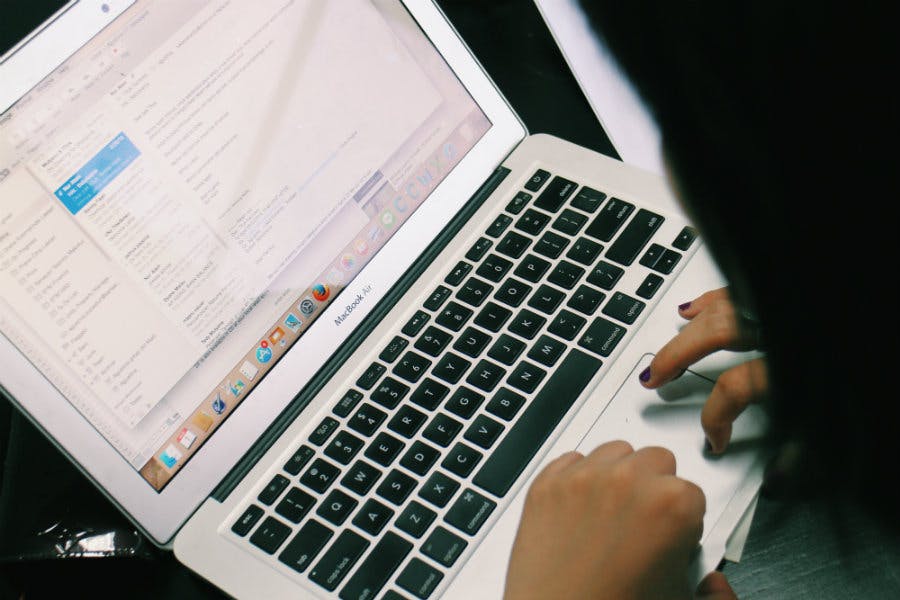When so much of our lives are digital, it’s important to be sure we’re approaching that element in a healthy and uplifting way.
There's a saying that “everything is good in moderation.” This adage can apply in many different areas and we can most certainly apply it to our digital habits. While there is no doubt that the explosion and technology over the past decades has worked wonders for society, revolutionising commerce, changing the way we communicate, and more, there is such a thing as “too much of a good thing.” Without keeping our habits in check, our dependence on technology can quickly morph into something not unlike addiction.
Long story short: we have to be smart and self-aware when it comes to our digital patterns. Are any of these 5 common habits plaguing your life? Here’s what they are and how to work on changing them.
1. Using technology to procrastinate
Oh, is there anyone out there who can’t relate to this habit? The Internet is vastly entertaining, perhaps even more addictive than television. Each hour, 300 hours of video are uploaded to YouTube. In total, there’s more content on there than we could ever manage to watch, even collectively. The Internet is a virtual treasure trove of content and entertainment. There’s always something to read, watch, or peruse, and if you’re procrastinating on getting a task done, the Internet will be there to meet your need.
Technology, when used well, is a brilliant addition to our lives. But when we begin utilising things like mobile devices and the web to procrastinate, this can have a negative impact.
Once in a while, it’s ok to browse Facebook mindlessly or spend an hour on a humorous website. But when that activity becomes a habit, and especially when it detracts from our real work, we begin to lose our productivity. This can spiral into anxiety and frustration, too, since feeling less productive might contribute to feelings such as lowered self-worth.
When you’ve gotten into a cycle of procrastinating through digital media, it can be tough to break out of that. The Internet, after all, truly is addictive. Many of our online activities are known to release dopamine into the pleasure centres of our brain. We like this feeling and so we want more of it. Thus, the cycle of playing online games or raking in the Instagram likes continues and can build into an obsession. And if we’re avoiding doing errands or completing a task, it’s more likely than ever that we’ll want to feed into those good Internet-induced feelings.

Mindlessly scrolling the web is a popular way to procrastinate
How to stop using technology to procrastinate:
First of all, don’t beat yourself up if you find you’re in the habit of digital procrastination. It happens to many of us. Instead, take the opportunity to get curious and observant about your behaviour, and adjust it as necessary to ensure your focusing on your important life priorities.
The next time you catch yourself getting caught up in Facebook debates, or scrolling endlessly through your Instagram feed, take a moment to consider what’s propelling your action. Are you avoiding doing a chore? Putting off an assignment? Making an unpleasant phone call? If the answer is yes, try taking a break from your technology and crossing just one small thing off your list. More than likely, you’ll find you get into “work mode” and are able to cross additional things off your list.
Consider scheduling regular breaks. If you want to spend some time on Facebook, no worries. Just pencil it in. But only do so after you’ve completed a task. Make that annoying phone call, and then give yourself 15 minutes of digital fun. This is a great way to reward yourself for being productive, while also ensuring you don’t get carried away online. To stick to the time limit, set a timer. Then, it’s back to work!
You might need some external help to break your habit. Fortunately, there are many apps and programs out there that not only track your online habits, but prevent you from going to unwanted websites. A few of these include Moment, ClearLock, StayFocusd, and Cold Turkey.
2. Allowing social media envy to get the best of you
Another common digital habit is one that can affect your mental health and your personal happiness. This one goes by many names, but essentially, the habit involves comparing yourself to others via social media.
Nearly everyone seems to post their happiest moments to social media. Filtered, edited, and carefully-selected, our digital personas can be painstakingly-crafted, designed to represent us how we wish to be seen. In other words, social media is generally a highlight reel of people’s finest moments.
But despite knowing this, it’s all too easy to look at someone’s family photos on Facebook and feel envious. These people might seem to have the perfect husband, perfect family, and perfect clothes, but it’s vital to remember that there’s more to every story. If we only pay attention to what is surface, we can fall into a cycle of social comparison and start to get down on ourselves. Check out our post on “Facebook stalking” for more on this problematic behaviour.
This kind of social media envy only hurts you. It’s a really common habit to get into, especially with the glamourised lives we glimpse on platforms like Instagram, but to keep yourself feeling positive and happy, it’s best to keep this habit in check.
How to break yourself out of the social media envy habit:
Like with limiting your time procrastinating on social media, you have to set limits for yourself for this habit, as well. Also take note of when you find yourself falling into the social media comparison trap, and have tools at the ready to help you get out of it.
Perhaps the most powerful of these tools is practising gratitude. When you catch yourself feeling jealous of another person this is often a sign that you're not spending time in gratitude for your own gifts, talents, and joys. Many people find that spending time away from technology and reflecting on their own personal gratitude is highly beneficial. You might try something such as a daily journaling routine in which you list the things for which you are grateful. This can take you as little as 5 minutes, but just spending time jotting down the happy aspects of your life can work wonders for your mental state. If you find yourself scrolling Instagram and wishing you were living someone else's life or that you looked like somebody else, etc., pull out your Journal and read over your gratitude list. It's almost guaranteed to brighten your spirit and remind you that you have so much to be thankful for.
3. Letting email run your life
Email is terrific. It saves us time by helping us communicate more efficiently with colleagues, friends, and family. Instead of having to contact others via the phone you can simply type up an email and send it off instantly. The recipient can then reply at their leisure.
However, therein lies the problem. Not many of us are approaching email in a leisurely way. In fact, it seems that a large majority of Internet users would classify email as stressful.

Don't let your inbox be the cause of of extreme stress.
You might have a seriously full email inbox which needs your attention. Or possibly you're simply receiving a notification every time a new email arrives in your inbox. Are you immediately rushing to check the email and reply? Are you reading your emails before you even get out of bed in the morning? Statistics show that 80% of us check our emails first thing in the morning even before brushing our teeth. This is a problematic behaviour to start your day with because you're beginning the morning already facing a list of to-do's, emails that need to be replied to, a barrage of seemingly ‘urgent’ matters, and much more. Talk about stress. Once you've read your emails you're definitely going to feel compelled to reply right away. Suddenly it's not even 7:30 a.m. and you're already working. If this scenario sounds familiar it's no wonder you feel stressed by day's end. You might even continue checking your email throughout the day, including late into the evening or during the dinner hour.
Having your email run your life is detrimental. Not only can it cause non-stop stress, you can be made to feel like you need to be available 24/7 particularly to coworkers or to your boss. In the vast majority of circumstances, this is not the case. You deserve your time off time spent with family or enjoying hobbies. If you're constantly chained to your inbox or to your email notifications you're experiencing a day filled with constant distractions.
How to break up with your email inbox:
First things first. Turn off those pop-up notifications on your mobile device. You'll be less tempted to open up the email app if they’re not appearing all the time. Plus, those push notifications will interrupt you throughout the day, compromising your productivity and possibly even serving to overwhelm you.
Many professionals swear by a practice of setting aside a very specific time to read and reply to emails. Notice that both activities are completed in one sitting, and then, ideally, the inbox is not looked at for the remainder of the day or at least for many hours. This works well for a lot of people because it separates your email from your daily to-do list. In other words, you've already got things on the docket for today; reading your email will only add more to the list (perhaps more than you can even manage today) Set aside specific amount of time per day to reply to your emails. Depending on the activity level in your inbox, you might spend 20 minutes up to an hour or more. The point is to do it all in one session because then your email is sorted for the day. Any matters that come through later you can delay until tomorrow. To be honest, 99% of the time the things that we receive in our email inbox are not as urgent as they appear, and they can certainly wait a couple of hours until your email session.
With just a few small lifestyle Changes like this you will find that you have a lot more freedom from the prison of your inbox.
4. Checking your phone during mealtimes
In the past several years, our mobile phones have basically become extensions of our arms. Understandably, it’s tough to put them down. Who knows what you might miss?
Well, when you’re in the company of others, particularly at mealtimes, you will definitely miss those face-to-face interactions if you’re on your device. Being in the moment with people you care about is far more important than updating your Twitter or getting to the next level in Candy Crush.
How to cure this habit:
The simplest solution to this is to remove your phone from the situation. Don’t bring it to the dinner table. Leave it in your purse if you’re out at a restaurant. You will likely want to set these rules for your family as well, but be sure to follow through. Leading by example is the best way to demonstrate to your kids how to live a life of balance in a digital world.
If you’re out with friends, you can also help keep each other accountable. In the past few years, it’s become popular to make a wager with friends for who can stay off their device the longest. The first to crack pays for dinner!

Your phone will still be there later. Dinner time is a time to enjoy the company of your friends or family.
5. Not properly protecting your data and information
The final examples of a negative digital habit involve your approach to security.
The first has to do with your passwords.
For some reason, despite countless occurrences of hacking, data leaks, and other alarming cybersecurity breaches, most of us are still using weak and easy-to-guess passwords. In 2018, a collection was created of passwords that had previously been hacked in data breaches. Once these are leaked, they are unfortunately available to attackers who could utilise them for a variety of odious purposes. Yet, despite these millions of passwords having been part of major data breaches, research revealed that “86% of subscribers were using passwords already leaked.” This means that an enormous amount of people are continuing to use compromised passwords to “secure” their information.
Definitely not a great idea.
Using a common password means committing another digital sin. If you’ve ever used “abc1234,” “qwerty,” or, worst of all, “password,” you may want to update your information. These passwords are extremely easy to guess. The same is true if you use any personally identifying information as part of a password, such as the name of a child or a pet (which 28% of users do). Hackers have developed sophisticated tools to crack even the most complex of passwords; you’ll want to be sure you’re making yours as tough as possible.
Here’s how experts suggest creating the strongest passwords. Another rule of thumb, try never to use the same password twice. Consider using a random password generator if you’re struggling to create numerous secure passwords.
It’s not just weak passwords that comprise our no-no digital habits. A frightening number of us never back up any of our data. This includes not just individuals but businesses. In fact, small companies lose on average more than $100,000 in downtime due to a single ransomware incident.
How to solve your data dilemmas:
Being prepared for the event of a hardware malfunction or other problem is key. While many of us rarely think to backup our computers, let alone our mobile devices, doing so could save us time, stress, and maybe even money.
Simple online tutorials are your friend in this case. Start here, with how to backup your computer. Then move onto your mobile devices. Once you’ve figured out a system that works for you, set an alarm to remind you to do it regularly, or seek out a tool that can provide you with automatic backups on a weekly (or even daily basis). This small step of precaution could make a major difference in your life.
Wrapping Up
Approaching our digital life in balance is so important, helping us manage career, family, and more. To have the lifestyle we desire, it may be worth examining our own digital habits and taking steps to break the most nefarious ones.